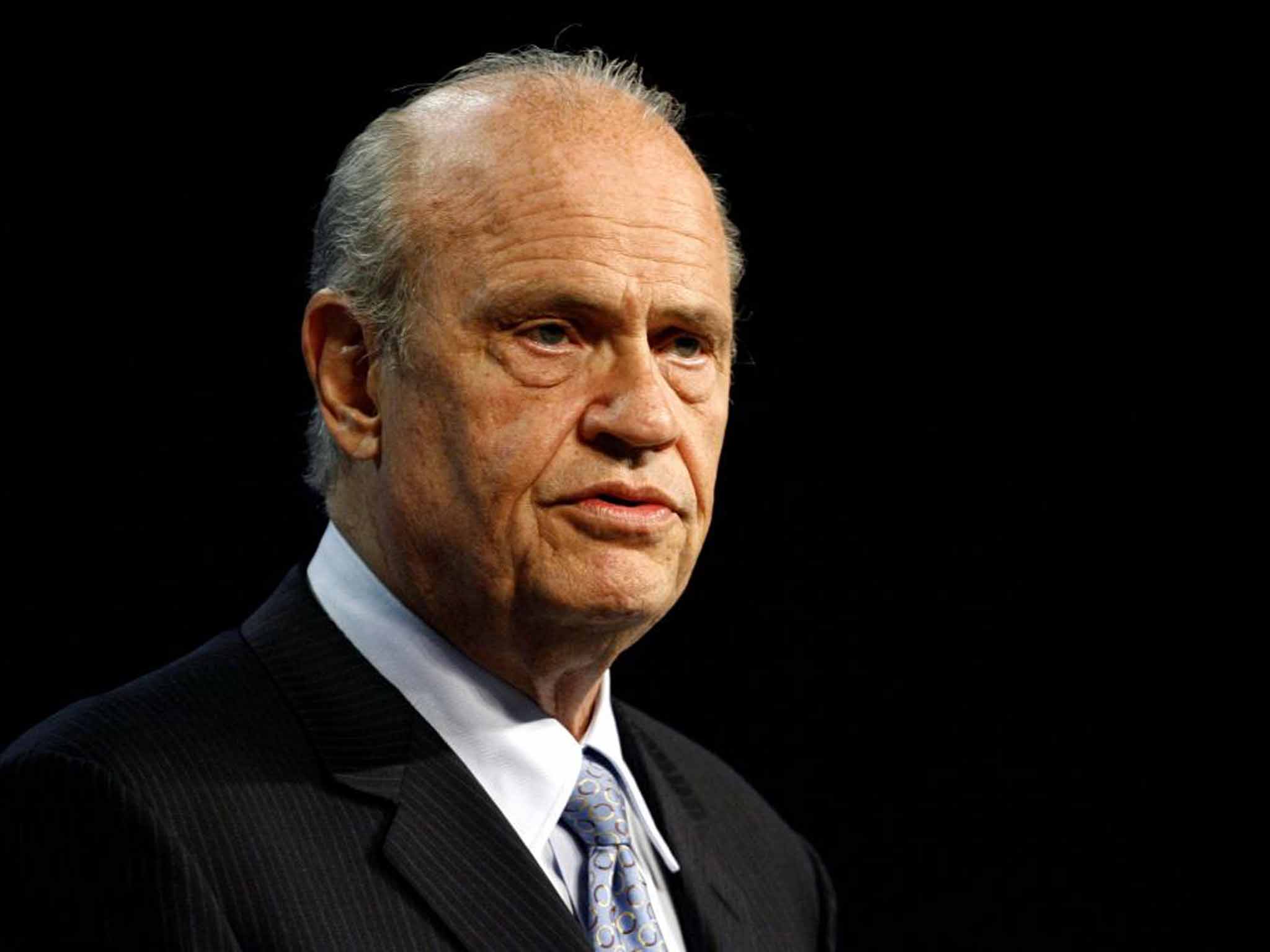Fred Thompson: Star of the TV series 'Law and Order' and politician who helped bring down Richard Nixon
In many ways, his life was an enactment of the American Dream

When it came to folksy, intimidating and authoritative, Fred Thompson had the market sewn up. In a remarkably varied career, he used these commanding talents to achieve success as a lawyer, a lobbyist, an actor and as a US Senator, blurring the lines between fact and fiction as have few others in American life.
Be it as a movie-screen admiral in The Hunt for Red October, or as a pivotal supporting player in the real-life Watergate drama, or as a candidate seeking the very top job in a 2008 White House bid, the basic persona never changed. Six foot five inches in his socks, and possessed of a resonant and syrupy southern drawl, Thompson was dominating but reassuring, and the epitome of down-home common sense. Almost always he was a good guy in a position of authority – a character with whom you messed at your peril.
In many ways, his life was an enactment of the American Dream. The son of a car salesman, he was the first member of his family to go to university. At school he was a moderate student at best, but then a little-suspected academic ability emerged as he won scholarships to two eminent southern law schools, taking his law degree from Vanderbilt in Nashville in 1967.
The Tennessee connection would provide a first launching pad to national attention. After serving as an assistant US prosecutor in Nashville, he was drawn into Republican politics, working on the 1972 re-election campaign for the state's senior Senator, Howard Baker. Returned to Washington, Baker became minority leader of the special Watergate committee and chose Thompson as minority counsel.
On 16 July 1973, live on national television, it was Thompson who posed Alexander Butterfield, a former close aide of Richard Nixon, the question that would ultimately bring down a president: “Mr Butterfield, are you aware of the installation of any listening devices in the Oval Office?” he asked. “Yes, sir,” came the reply, and a little over a year later, Nixon resigned.
No matter that Thompson had known the answer in advance, since the committee had interrogated Butterfield in private three days earlier; he had become a minor national celebrity. There followed a lucrative spell as a lobbyist, punctuated by legal work, most notably representing Marie Ragghianti, a whistleblower in another scandal, that would bring down a Tennessee governor for influence-peddling.
The affair was turned into a book, and later a film, Marie, in which Thompson was prevailed upon to play himself. It was soon evident that he was a natural actor. Other roles followed: the admiral in Red October, as a CIA director in the taut 1987 thriller No Way Out that starred Kevin Costner and Gene Hackman, and as White House chief of staff in the 1993 drama In the Line of Fire.
By the time his old patron Baker had persuaded him to seek the Tennessee Senate seat vacated by Al Gore, the new vice-president, Thompson had collected 18 Hollywood credits. He was to prove as adept at politics as in acting. In 1994 he was elected by a landslide to serve the remaining two years of Gore's term, and in 1996 won a full six-year term, again by an overwhelming margin.
Back in Washington he inevitably became a highly visible figure, leading the Senate Committee on Governmental Affairs until the Democrats regained control of the chamber in 2001. Within his party he was regarded as a solid conservative, but without special ties to the evangelicals and social conservatives who would later become so dominant. Today he would be considered a moderate, despite his support for gun rights and opposition to abortion.
The following year saw another twist in Thompson's career, as he decided against seeking a new Senate term (which he assuredly would have won) to return to acting. During his last months in Congress he was already shooting episodes of the hit NBC series Law and Order, in which he played the gruff Manhattan District Attorney, Arthur Branch. Dick Wolf, the show's producer, described the ex-Senator as “the living definition of command presence.”
But after other TV appearances Thompson once more veered back to politics, this time in pursuit of the White House itself. The Oval Office, alas, proved a bridge too far. In the movies he had played the role of president three times. In real life, persona alone was not enough. When Thompson entered the race in 2007, many saw another Ronald Reagan. But the energy and the will were oddly lacking. His campaign was lacklustre, and after making little impression in the first primaries he dropped out in January 2008.
Thereafter Thompson dipped in and out of the public limelight. He did some acting, most notably as the populist Democratic politician William Jennings Bryan in the TV film Alleged, based on the Scopes Monkey Trial. He was also briefly a talk radio host.
In his final years he was perhaps best known as a TV pitchman for reverse mortgages. The product is not without controversy, but it could have no more effective a salesman than Fred Thompson – amiable, reassuring and commanding to the last.
Fred Dalton Thompson, lawyer, actor and politician: born Sheffield, Alabama 19 August 1942; married 1959 Sarah Elizabeth Lindsey, (divorced 1985; two children, and one child deceased), 2002 Jeri Kehn (two children); died Nashville, Tennessee 1 November 2015.
Subscribe to Independent Premium to bookmark this article
Want to bookmark your favourite articles and stories to read or reference later? Start your Independent Premium subscription today.

Join our commenting forum
Join thought-provoking conversations, follow other Independent readers and see their replies